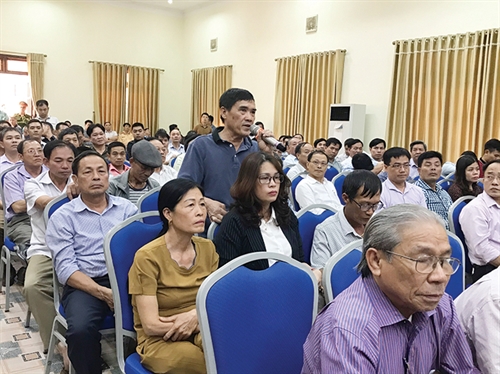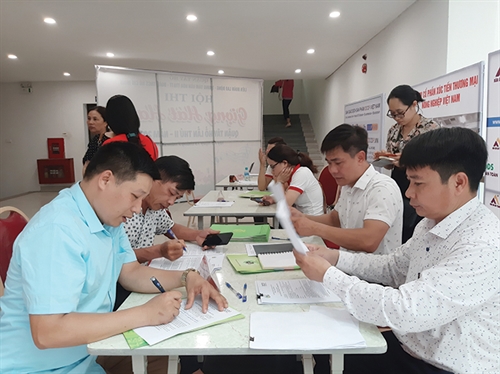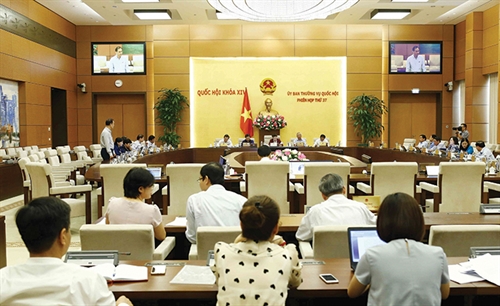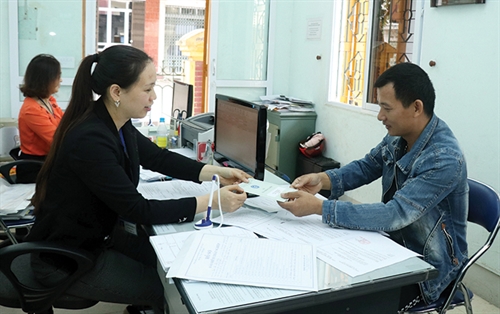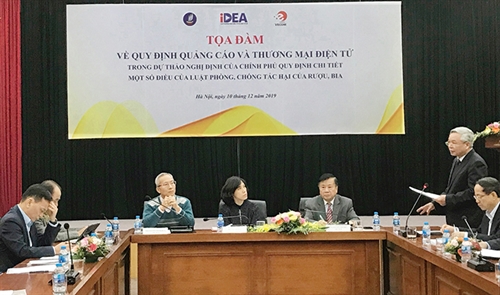Assoc. Prof. Dr. Nguyen The Chinh
Director of the Institute of Strategy and Policy on Natural Resources and Environment
Ministry of Natural Resources and Environment
Identifying environmental industry under the impact of Industry 4.0
Environmental industry constitutes an industrial sub-sector in the group of economic sectors which supply technologies, equipment, products and services to satisfy waste treatment demands and standards for the environmental protection work. This industry functions to manufacture and supply wastewater treatment technologies and equipment; equipment and means for collection, transportation, sorting and treatment of solid wastes; technologies, equipment and machinery for treatment of emissions; equipment for analysis, monitoring and control of environmental parameters; materials and preparations for treatment of environmental pollution; and machinery and equipment for treatment of supplied water, renewable energy, clean energy and power conservation.
The manufacture and supply of products of the environmental industry with the application of the achievements of Industry 4.0 on the basis of integrating physical, digital and biological spheres together with breakthroughs of the Internet of Things (IoT) and artificial intelligence (AI) will bring about high efficiency and marked technological renewal in the environmental domain as compared to the previous time. Industry 4.0 characterized by making the absolute use of spillover effects of digitalization and information technology will create a strong impetus for development of the environmental industry.
With regard to developed countries in the Group of Seven (G-7) and other nations such as China, Republic of Korea and Singapore, the manufacture of environmental industry products has witnessed changes in production modes, based on the achievements of digital technology, AI, IoT, nano technology, software development to create automatic and digitalized products, and cyber space serving the control, management, operation and even remote supervision of the collection, transportation and treatment of solid wastes, wastewater and emissions, and water supply. Advantageous new-generation industrial products will help reduce the workforce, restrict the direct human involvement, and bring about high production efficiency.
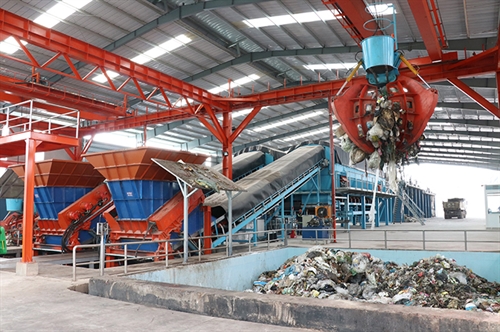 |
| A technological chain for producing organic fertilizers from household waste in Binh Duong province__Photo: VNA |
As for Vietnam, the environmental industry has seen the annual average growth rate exceeding 15 percent due to higher demands for environmental pollution treatment and environmental equipment in the context of constant economic growth. The total workforce in the fields of water supply, and garbage and wastewater management and treatment is over 107,600. The Scheme on development of Vietnam’s environmental industry toward 2025 issued under Prime Minister Decision 192 of 2017 identified the objectives of Vietnam’s environmental industry of striving to turn out environmental industry products not only for domestic consumption but also for export. The Scheme also sets forth the objectives of manufacturing equipment for supplied water and wastewater treatment or for emission treatment meeting 70-80 percent of needs; equipment for solid waste treatment and recycling satisfying 60-70 percent of needs; and equipment for waste collection, transportation and classification meeting 50-60 percent of needs. So, if the above objectives are attained in the five years to come, Vietnam’s environmental industry will affirm its position in the system of industries and satisfy the essential market demands for the environmental protection work. Yet, it is not an easy task because of a low rate of enterprises’ involvement in Industry 4.0, merely at a ratio of 0.14/5. In addition, human resources meeting scientific-technological and innovation requirements remain limited, failing to create a driving force for innovation and shift to digital economy. In reality, the environmental industry is not fully ready for the materialization of Industry 4.0 in Vietnam.
Opportunities and challenges for development of environmental industry in Vietnam
Opportunities
First, the Party’s guidelines on development of the environmental industry and the Government’s realization of such guidelines have created favorable conditions for environmental industry enterprises to carry out development investment activities associated with Industry 4.0. Particularly, with the issuance of Politburo Resolution 52/NQ-TW of September 27, 2019, on a number of guidelines and policies for proactive participation in the Fourth Industrial Revolution, not only startups but also environmental industry enterprises feel more favorable while making proactive investment and technological renewal in order to turn out environmental industry products of high quality and great efficiency which can compete with similar products of other countries.
Second, the room for development of the environmental industry in Vietnam remains large and the great demands for hi-tech and high-effect industrial equipment for collection, transportation and treatment of solid wastes, treatment of wastewater and emissions and water supply have opened up opportunities for the environmental industry to develop.
Third, the development of the environmental industry together with Industry 4.0 in the world, particularly in highly industrialized nations, has offered opportunities for Vietnam to learn experience and transfer technologies for development of the environmental industry in the country.
Fourth, Vietnam is currently in the process of national industrialization and modernization as well as intensive and extensive international integration. The country’s accession to new-generation trade agreements such as the European Union-Vietnam Free Trade Agreement (EVFTA) and the Comprehensive and Progressive Agreement for Trans-Pacific Partnership (CPTPP) will create opportunities for development of the environmental industry based on high technological level under the conditions of Industry 4.0, or even Industry 5.0 currently materialized by Japan.
Fifth, the environmental industry remains quite new in Vietnam and, therefore, is not much affected by old technologies. The development of the environmental industry associated with Industry 4.0 will be an opportunity for Vietnam to introduce right at the initial stage modern equipment and products of high competitiveness at home and abroad.
Challenges
Besides opportunities, Vietnam faces challenges to the development of its environmental industry.
First, by the awareness of enterprises, managers and the entire political system about the development of the environmental industry in the context of Industry 4.0 should be renewed in order to create a consensus in the society.
Second, by it is not a small challenge to create an impetus for environmental industry enterprises to participate in, and shift to, the manufacture of hi-tech products, which requires breakthrough mechanisms and policies while the existing legal documents have yet mentioned the development not the environmental industry.
Third, by there are not enough human resources capable of participating in the environmental industry and possessing technological knowledge up to requirements of Industry 4.0 while the backward management methods still exist here and there.
Fourth, by it is required to invest in building complete infrastructure facilities for the development of the environmental industry, particularly information technology infrastructure facilities, cyber security assurance and information processing speed.
Fifth, by with a short period of technology development, Vietnam must make greater efforts in the manufacture of environmental industry products which are competitive in quality, price and durability, especially under the conditions that Vietnam has opened its economy and concluded various new-generation trade agreements.
Solutions to development of environmental industry
In order to successfully develop the environmental industry in the context of Industry 4.0, some solutions below should be taken:
First, in the spirit of Politburo Resolution 52/NQ-TW, first of all, it is necessary to scrutinize Prime Minister Directive 16/CT-TTg of 2017 on building the capacity to approach the Fourth Industrial Revolution, and Prime Minister Decision 192/QD-TTg of 2017, with a view to renewing the methods of management and investment in the development of products of the environmental industry, based on application of the achievements of Industry 4.0. At the same time, it is a need to review policies, particularly legal provisions related to development of the environmental industry, for amendment, supplementation and improvement so as to encourage enterprises to develop environmental industry products.
Second, it is required to train and retrain human resources as this is an essential factor for development of the environmental industry in the context of Industry 4.0, not to mention the need to raise knowledge, change awareness and renew management modes for human resources in this field. Particularly, priority should be given to any stage in the product value chain where changes may be made soon. For instance, the mode of management through meetings, exchange of papers and documents, or direct administration of operation may shift to online administration with the use of digital technology to save time and costs.
Third, the development of the environmental industry requires investment in technical infrastructure, particularly the high-speed internet, shifting from 3G, 4G to 5G or higher, depending on each development stage for high-speed connection of things in the production and management process for the environmental industry while ensuring cyber security.
Fourth, international cooperation in development of the environmental industry in association with the development of Industry 4.0 is necessary for technology transfer and exchange of experience for proper application as suitable to Vietnam’s practical conditions.
Fifth, it is a need to promote the participation of innovative startups in the environmental industry. The guidelines on development of the private economy and innovation startups should be further specified for this industry. As appearing late, the environmental industry has various advantages for startup, therefore, specific incentive mechanisms should be formulated to create an impetus for development of this industry.
Last but not least, in order to develop the environmental industry in the context of completion of socialist-oriented market economy institutions in Vietnam, it is required to create and develop a market for the commodity products of this industry because, at present, some existing markets like those for solid waste or wastewater treatment products, water supply and renewable energy are still below expectations, particularly the market for high-quality and hi-tech products of the environmental industry.-
* The original article belongs to the Supreme People’s Court Magazine (Tap chi Toa an Nhan dan) and the Wildlife Conservation Society (WCS), Vietnam Program.



